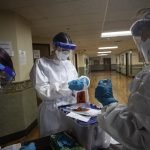‘Natural immunity’ from COVID-19 omicron can be limited and weak
In a recent study from Gladstone Institutes and UC San Francisco, researchers found that in unvaccinated people, infection with the omicron variant of COVID-19...
Third, fourth COVID-19 vaccine doses strongly boost antibodies in older people
Scientists from Rabin Medical Center found that the third and fourth BNT162b2 vaccine doses in adults aged 60 years or older are linked to...
At least 27 million people with COVID may have long-term smell and taste issues
Scientists from the National University of Singapore found that about 5% of adults may develop long-lasting changes to their sense of smell or taste...
This test could detect COVID-19 infection and severity very quickly
In a recent study from George Washington University, researchers developed a blood test that quickly detects if someone has COVID-19 and predicts how severely...
Widely used drugs may reduce ‘long COVID’ death risk by 50%
In a recent study from the University of Florida, researchers found that among patients hospitalized for COVID-19 who seemingly recovered, severe systemic inflammation during their hospitalization...
Smoking, vaping linked to higher risk of severe COVID-19, death
Scientists from the University of Louisville found people who reported smoking or vaping prior to their hospitalization for COVID-19 were more likely to experience...
COVID-19 likely first spread to humans from animals in a Wuhan market, study finds
Scientists from Scripps Research and elsewhere found the COVID-19-causing coronavirus, SARS-CoV-2, likely first spread to humans from animals in two separate transmission events in...
Your finger length could help predict severe COVID-19
In a recent study from Swansea University, scientists found the link between levels of sex hormones in the womb and in puberty and COVID...
Scientists find why COVID-19 is severe in some people and mild in others
Scientists from Mayo Clinic found key human genomic signatures that could help explain why COVID-19 is severe in some people and mild in others.
They...
A third COVID-19 booster is key to identifying and fighting new variants
Scientists from the University of Surrey found that 20 different COVID-19 variants were effectively identified and neutralized after a third booster.
The research is published...










